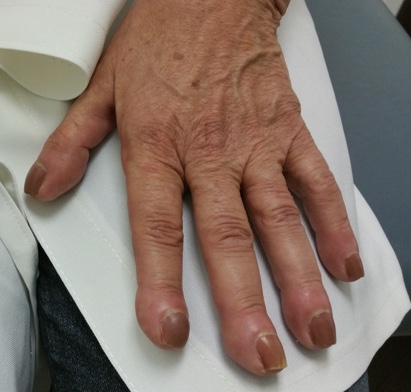What Is
Interstitial
Lung Disease (ILD)?
LEARN MORE
If you’re wondering if you or a loved one could have ILD—or if there has been a recent diagnosis—you’ve come to the right place. On this page, we’ll help you understand ILD, its connection to pulmonary fibrosis, its symptoms, how it may progress, and more.
Interstitial Lung Disease
Overview
ILD can be a serious lung disease that is caused by many different factors, including autoimmune diseases, exposure to harmful substances, like asbestos or silica dust, and medications, as well as many unknown factors. It leads to common symptoms, like a dry cough and shortness of breath. ILD may also cause serious damage to the lungs, including:
Scarring of the lungs (pulmonary fibrosis)
ILD can cause scarring of the lungs, which is commonly called pulmonary fibrosis. The scarring takes place in the interstitial tissue, which is the tissue around the lungs' alveoli sacs where oxygen passes into the bloodstream.
This scarring causes the lungs to become thick and stiff, making it difficult to breathe. The scarring may also become progressive, which means it continues to get worse over time. You may hear this referred to as having a chronic ILD with worsening fibrosis.
Helpful hint
You may be more familiar with pulmonary fibrosis than ILD because some medical specialists use the term pulmonary fibrosis when describing ILD that causes lung scarring.
Inflammation of the lungs
ILD causes inflammation of the lungs. This happens when something causes the body's immune cells to accumulate in the lungs' interstitial tissue.
ILD can lead to primarily scarring or inflammation of the lungs, or have a mixed degree of both at the same time.
We’re here for you.
Call 1-844-473-2638 for support.
Sometimes you have more questions than answers. Call the
Lungs&You® Call Center to speak with someone who
can help you get the information you need to help take an active role in
your health.
Keep in mind, Lungs&You® does not provide medical advice. Please
consult with your healthcare provider if you have specific questions about
your health.
4 Quick Facts About
Interstitial Lung Disease
ILD has many different causes
ILD can be caused by many known factors, like rheumatoid arthritis, scleroderma, sarcoidosis, and exposure to harmful substances, as well as many unknown factors.
ILD can lead to pulmonary fibrosis that may continue to get worse over time
ILD may cause pulmonary fibrosis, which means scarring of the lungs. This scarring can be progressive.
ILD lung scarring can be irreversible
The damage caused by lung scarring can be permanent.
ILD is tough to recognize
Its symptoms, like a persistent cough, shortness of breath, and fatigue, are similar to symptoms of more common conditions. Ruling out those conditions may cause a delay in diagnosing ILD.

Sign up for emails and a free eBook
Sign up for emails and a free eBook
Interstitial Lung Disease
Signs and Symptoms
Shortness of breath
Feeling breathless during activity or even at rest.
Persistent, dry cough
A cough that doesn’t produce phlegm and won’t go away.
Fatigue
Feeling tired—even after light activity.
Unexplained weight loss
Weight loss that can’t be attributed to diet or exercise.
Clubbing or widening of the fingertips
Fingertips widen—making them appear rounder than usual.

Crackling breath sounds
Lungs may make a Velcro-like tearing sound when heard through a stethoscope.
Muscle and joint pain
Over time, muscles and joints may become sore.
Find pulmonologists
What Causes
Interstitial Lung Disease?
Many different factors can lead to ILD, including autoimmune diseases, exposure to harmful substances, like asbestos or silica dust, and medications, as well as many unknown factors. Read the list below to learn more about some common causes of ILD and talk with your healthcare provider about the possible causes.


You’re not alone in this
—Lungs&You® is just a phone
call away.
Do you have questions but no answers about your lung health? Are you looking to connect with someone who can help? Call us—we’re here for you.
Monday - Friday, 9 am - 6 pm ET
Keep in mind, Lungs&You® does not provide medical advice. Please consult with your healthcare provider if you have specific questions about your health.